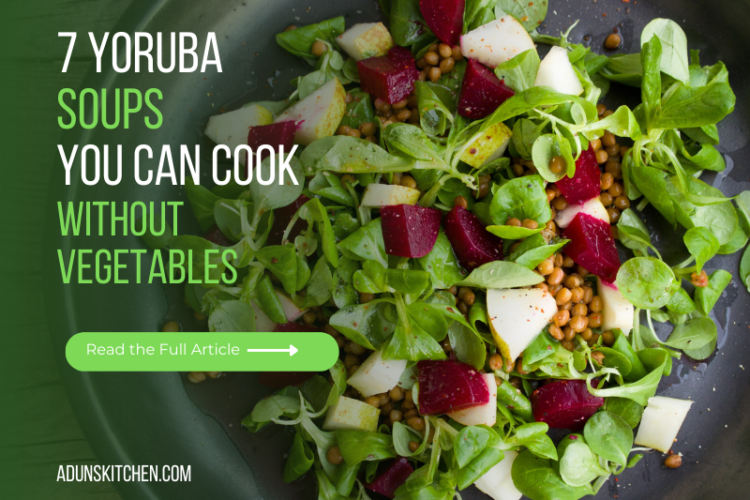Is there a soup in Nigeria that is without vegetables? You will hardly see such soup, and the traditional soups of the southwest, Nigeria, are no different. Every tribe in Nigeria mainly cooks their soups with vegetables. Even though we have some soups in southwest Nigeria that can be cooked without adding vegetables, the notion is that these soups cannot go well with a swallow.
These traditional Yoruba soups use other ingredients, such as beans, peppers, plantain, or meat, to create a hearty and nourishing dish.
In this article, we will explore seven different Yoruba soups that can be cooked without vegetables, providing a range of options for a comforting and filling meal. Whether you are a fan of traditional Yoruba cuisine or looking to try something new, these soups will surely delight your taste buds and satisfy your hunger.
Here is the list of soups you can cook without adding vegetables.
Also read: List Of Soups In The Southwest (Yoruba) Nigeria
1. Omi Obe (Stew)
Omi Obe is a delicious soup with many proteinous foods like fresh mackerel, tilapia, or beef. Some people pair this soup with Ewedu to eat swallows like Amala, Eba, or pounded yam. Others like to have theirs with Eba, rice, beans, Eko, and yam. The Yorubas love this soup so you will find it at most local restaurants and Yoruba parties. They call it Obe Eja Tutu (Fresh fish soup).
The difference between the soup and the regular stew is that the consistency is not too thick or loose; it is somewhere in between and has a smoothly blended pepper mixture. Unlike the regular stew, the pepper mixture is usually rough when blended, and the consistency is thick. You can also pair this Omi Obe with plain Okro, vegetables, Ewedu, and Gbegiri to make a complete soup.
How to cook Omi Obe
For this recipe, you will need

2. Egusi Ijebu
When you cook Egusi (melon seed), it has this naturally sweet flavor. No wonder it can go well independently, even without adding vegetables. This Egusi soup without vegetables originates in Ijebu, the southwestern part of Nigeria; that’s why it is called Egusi Ijebu.
This soup is famous among Ijebus, but some other Yorubas also like to cook this delicious meal.
How to cook Egusi Ijebu
We use a very smooth blended egusi for the soup; unlike the one we cook with vegetables, the Egusi is always roughly blended and dry. This soup has a unique, rich, and flavourful taste. Egusi soup is one of my favorite soups. The soup is easy to cook, doesn’t require many ingredients, and is a healthy food rich in protein, fats, minerals, and vitamins.

Read Also: How to cook Egusi Ijebu with Ewedu
3. Obe Ishapa
This is another beautiful traditional soup that you can cook without using vegetables. The native soup originated from the Egbas, Abeokuta, Ogun State, Nigeria, and is widely eaten among other Yoruba states.
Even though it is not so common in other parts of Nigeria, it is a soup everyone should try. It is highly nutritious and made using Roselle (Hibiscus sabdariffa) or fresh white zobo leaves with Egusi. The soup is rich in vitamin C and contains antioxidants that help to prevent diseases. If you love Egusi very well, try this Ishapa soup, you will love it.
How to cook Obe Ishapa

4. Gbegiri
Gbegiri (beans soup) is popular among the Yorubas, and it is also called Abula. It is one of the easiest soups from western Nigeria and does not require many ingredients. This particular soup is cooked with peeled beans. The beans are peeled, and then you cook with ingredients like palm oil, ground crayfish, assorted meat, grounded pepper, or fresh pepper are used. You can pair it with your swallow like this or with Omi Obe (stew) and Ewedu (this is the usual way).
How to cook Gbegiri soup

5. Obe Dudu
Obe Dudu is known as Ayamase, a typical soup in Ogun state, Southwest Nigeria. A spicy and flavorful soup that is popular in Yoruba cuisine. This soup has a unique flavor due to its combination of unique ingredients. Ingredients like bleached palm oil, green bell peppers, and assorted meat give it a distinct flavor.
How to cook Obe Dudu

6. Obe Koro-Owu
This Koro-Owu soup is a special soup that originated in Owo, Ondo State, Nigeria. Koowu is made from cotton seeds and is mainly eaten by the people in Ondo State.
The cotton seed has numerous health benefits for you. The soup is highly nutritious and easy to cook too.
How to cook Obe Koro-owu
7. Obe Ajo
Ajo means turmeric. Obe Ajo has its main ingredient as turmeric, which is why they call it turmeric soup. Obe Ajo is mainly eaten by the Akure people in Ondo State, Nigeria.
This Obe Ajo is known for its bright yellow color and rich flavor. It is a delicious and healthy soup you will love. It is made with a blend of spices, including turmeric, known for its anti-inflammatory and antioxidant properties.
Turmeric is highly medicinal with many positive side effects, so this soup is unbeatable.
How to cook Obe Ajo
Final Note
In summary, Yoruba soups are a rich and flavorful aspect of Nigerian cuisine. Whether cooked with or without vegetables. These soups are typically made from a combination of different meats, fish, and spices, but they will still be delicious and nutritious if you don’t use vegetables. While vegetables are a common ingredient in many Yoruba soups, plenty of delicious options can still be enjoyed without them.
Are you familiar with these soups? What other soup do you know that can be made without vegetables? Please, share in the comment section.


